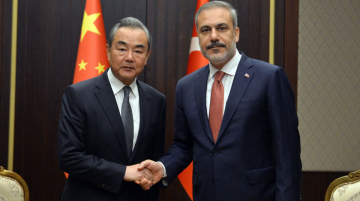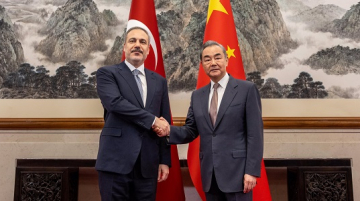
By Buğra Süsler
Last December Turkish Minister of Foreign Affairs Mevlüt Çavuşoğlu held an end-of-year press conference to review the year’s foreign policy developments and Turkey’s relations with the world. A highlight of this conference was his exceptionally open criticism of China. He stated that Turkish-Chinese ties suffered because Beijing was “disturbed” by Ankara’s policy of “defending the rights of the Turkic Uyghurs in the international arena”. He said China was not permitting the Turkish ambassador to freely visit the Xinjiang Uyghur Autonomous Region and was trying to dictate the terms. “Why would we be a tool of Chinese propaganda?” he asked. Ankara has expressed similar concerns in the past while also acknowledging China’s “right to combat terrorism”. However this time the tone of public criticism appeared to be sharper, which was arguably influenced by domestic and international factors.
In the Turkish domestic arena, the Justice and Development Party (AKP) government and its ally, the Nationalist Movement Party (MHP), have increasingly faced criticism for failing to take a consistent stance on the Uyghur issue. Iyi Party, in particular, which is the second largest opposition party in the Nation Alliance (Millet İttifakı) after the Republican People’s Party (CHP), has often accused the government of toning down rhetoric about the Uyghurs to avoid antagonizing Beijing.
Iyi Party has recently criticized the government for not taking concrete and timely action to lobby Muslim-majority states who, in October 2022, voted against a motion at the UN Human Rights Council to debate the treatment of Uyghurs and other Muslim minorities in China. In a parliamentary meeting in November 2022, Foreign Minister Çavuşoğlu replied saying that they did not see the solidarity which they hoped to see in the Muslim and Turkic world.
It is conceivable that the criticisms raised by the opposition may have implications for the upcoming 2023 general elections in Turkey, especially considering that both Iyi Party and MHP seek to attract nationalist voters who would like their government to play a more active role in this area. The fact that Foreign Minister Çavuşoğlu took the time in his end-of-year speech to address and deny the claims on social media that Turkey was extraditing Uyghurs holding Turkish citizenship to China is an indicator that the government is concerned with addressing public perceptions of its policies.
In the international arena, the publication of former UN High Commissioner for Human Rights Michelle Bachelet’s August 2022 report, which detailed “serious human rights violations” in Xinjiang and was rejected by the Chinese government, appears to have contributed to Ankara’s sharper rhetoric. Foreign Minister Çavuşoğlu has cited the report, used it as a reference point, and said Turkey needed to speak up against the violations described in the UN report.
At the same time, China is an important economic partner for the Turkish government which is facing economic challenges and soaring inflation at home. In recent years, trade volume between Turkey and China has significantly increased while Ankara has welcomed Chinese investments and supported China’s Belt and Road Initiative.
Indeed, President Recep Tayyip Erdoğan, who has often pushed for Turkey’s membership in Russia and China-led Shanghai Cooperation Organisation (SCO), further sees China as a partner to expand Turkey’s presence on the world stage. Therefore, despite potential tensions which may arise in some areas of Turkey-China relations, it is reasonable to expect a strong and continuous emphasis on mutually beneficial cooperation in the foreseeable future.
Dr. Buğra Süsler is a lecturer in international organizations and international conflict and cooperation at University College London Political Science Department and Visiting Fellow at LSE IDEAS, London School of Economics.









